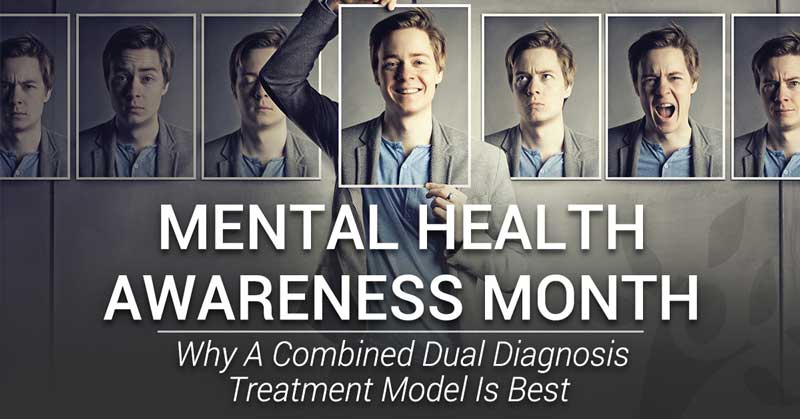 Throughout the month of May, the National Alliance on Mental Illness (NAMI) brings awareness to mental health conditions. The goals of Mental Health Awareness Month are to reduce the stigmas associated with mental illness, provide support to individuals and families and educate the public.
Throughout the month of May, the National Alliance on Mental Illness (NAMI) brings awareness to mental health conditions. The goals of Mental Health Awareness Month are to reduce the stigmas associated with mental illness, provide support to individuals and families and educate the public.
By working together, more people are able to get the help they need, and families feel less isolated in their fight against mental illness.
Mental Illness Affects Millions, Including Young People
- One in five Americans will be affected by a mental health condition in their lifetime, according to NAMI.
- Each year, approximately 18 percent of American adults experience an anxiety disorder such as post-traumatic stress disorder or obsessive-compulsive disorder.
- Almost 7 percent of adults have at least one major depressive episode in their lifetime. Over 2 percent of US adults live with bipolar disorder, and 1 percent have schizophrenia.
It’s not just adults that are affected by mental illness but children and teens as well. NIMA reports that 21 percent of youth aged 13-18 experiences a severe mental disorder at some point in their lifetime. For children 8-15, that number is 13 percent.
Mental Illness And Substance Abuse
Mental illness and substance abuse are interrelated. Among the 20.2 million adults who suffer with substance abuse, half of them have a co-occurring disorder. The most common mental health issues that go along with addiction are depression, bipolar disorder and anxiety.
It’s not always clear what comes first – the addiction or the mental illness. For some individuals, it’s the mental illness that surfaces first, and they turn to drugs or alcohol to deal with the symptoms. For others, using substances causes changes in the brain that lead to depression or anxiety or allows an underlying mental health disorder to surface.
Regardless of what comes first, substance abuse and mental illness are a dangerous combination that feed off each other. In order to fully recover, both components need to be properly treated.
Take A Deeper Look Into The Effects Of Anxiety Disorders
Dual Diagnosis Treatment
To successfully address both the substance abuse and the mental illness, seeking a dual diagnosis treatment center is ideal.
Dual diagnosis treatment combines both the addiction and the mental illness as part of the treatment recovery process.
The best programs should include the following:
- Simultaneous treatment for both the addiction and the mental illness.
- Highly trained treatment team which specializes in both mental health disorders and addiction.
- Integration of psychotherapeutic medications, if and when needed, such as antidepressants and anti-anxiety medications.
- Supportive, sober environment that builds self-confidence and self-esteem.
- Inclusive treatment approach that includes family and loved ones.
- Comprehensive treatment program that includes counseling, group meetings, education and alternative therapies.
Receiving A Dual Diagnosis
To be diagnosed with a co-occurring disorder, a person must meet the criteria for suffering from both an addiction as well as mental health illness. This criteria is determined by The Diagnostic and Statistical Manual of Mental Disorders, which is published by the American Psychiatric Association. A mental health professional or addiction specialist can make this diagnosis.
Once a diagnosis is made, the individual can receive comprehensive treatment for both the substance abuse and the mental illness. Beyond treatment, it’s highly important that the person learns how to manage stress, recognize their triggers and practice relaxation techniques.
Individuals with a dual diagnosis also need to adopt healthy lifestyle habits such as eating well, exercising and getting enough sleep. Participation in 12-step groups can also be very beneficial.
Remember To Raise Awareness & Help Break The Stigma!
As we raise awareness during Mental Health Awareness Month this May, think about the people in your life that could be helped with this information and share this article with them.
Mental illness is nothing to be ashamed of. Hiding it will only make matters worse and potentially lead to a pattern of harmful behaviors such as drug or alcohol abuse. By acknowledging a potential dual diagnosis and getting help, more lives can be changed and perhaps even saved.
Maryland Recovery offers individualized dual diagnosis treatment in a safe, supportive environment. Call us today to learn more about the extensive services we can offer you or a loved one. Maryland Recovery is here for you!
Learn More About Our Individualized Dual Diagnosis Treatment Program
Reviewed by Christopher Schwartfigure MS, LGPC, CAC-AD









